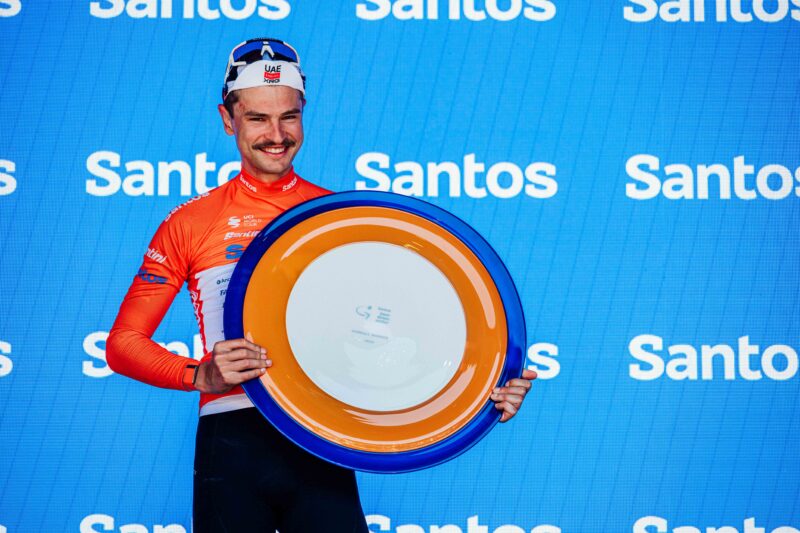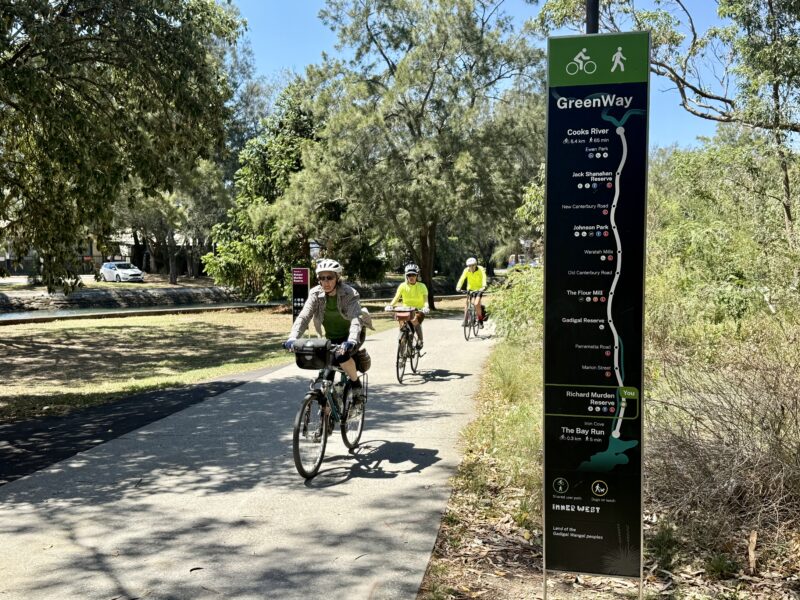Out-riding bad habits
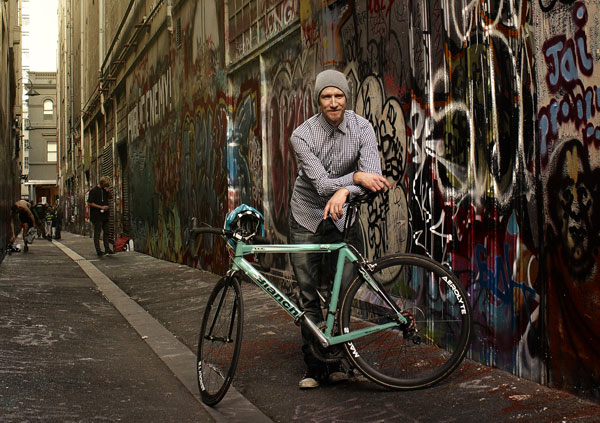
Photo by Karl Hilzinger
A passion for cycling can lead to big changes both on and off the track. Richard England tells Melissa Heagney how riding a bike has changed his (and others) lives for the better.

Name: Richard England
Age: 33
Occupation: Day Program Team Leader with YSAS
Bikes: Scott mountain bike, Bianchi FG Lite road bike
There are many life-changing moments in the life of a young, elite cyclist.
For Richard England it wasn’t a big win on the European circuit, or a gold medal at the Olympics. His life-changing moment was the simple act of watching a documentary.
England was studying Human Movement at RMIT University when he saw the film which featured a professional swimmer who spoke about their struggles with substance abuse.
Something struck a chord with England. It inspired him to want to work with people struggling with similar issues.
“It was something I really wanted to do—something I thought I could be good at,” England says.
So, he changed his studies from Human Movement to Youth Work and started on the path which has led to him working for YSAS (Youth Support and Advocacy Service) in Dandenong, in Melbourne’s south eastern suburbs.
Through his work, England helps young people often in high risk situations of substance or alcohol abuse, mental health issues, or those who have disconnected themselves from the wider world.
“It’s about re-engaging young people in education, helping them improve their confidence and leadership skills and offering harm minimisation—to better their understanding of how substance abuse interacts with their day to day lifestyles,” England says.
When England was the same age as some of the young people he helps, his day to day life included racing his bike at the local velodrome.
England says he first got into track racing as a student at Warrandyte High School student where a friend introduced him.
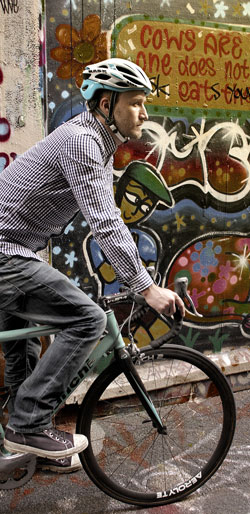
“I started riding when I was about 16,” England explains.
“An old school friend took me along to a junior development clinic at Brunswick Cycling Club and they taught the skills of racing on the velodrome.”
A “super quick” rider (a description by those who know him or have raced against him), England’s natural ability on the bike led to offers from international teams when he was in his early 20s.
Through his club—Blackburn Cycling Club—England was able to make valuable connections which helped him on the road to becoming a professional.
“It was a stroke of luck really … through my cycling club I met with a coach and developed a relationship with him and it opened up opportunities,” England says.
While he was studying for his degree, England was also a professional cyclist.
For six years—between 2002 and 2008—he rode with professional domestic teams in the USA and Europe.
Five of those years he was based in (and around) Michigan where he rode with team Bissell. He also spent a year in Tuscany, Italy, riding with Amore & Vita.
England was no slouch on the bike. He won a stage of the Tour of Georgia and a few Australian national championships including the Australian Criterium (2006) and Teams Pursuit (2005 and 2007) championships.
Though he loved racing, England says being a professional cyclist was a “side thing”—secondary to his true passion—the work he now does with YSAS.
The lessons he learned on the professional scene—the commitment, the training and of course, his university education are all things he has brought with him to his role at YSAS where he works as a Day Program Team Leader and Alcohol and Drug Youth Consultant.
He said the reasons for young people abusing drugs or alcohol are various, complex and the effects are often long lasting.
“It’s often triggered by things that happen in their childhood development and childhood trauma.
“Mental health plays a part,” England says.
England says he also uses his riding skills in his role.
“Through our program we do a lot of adventure therapy stuff,” England said, “that includes a lot of mountain bike riding.”
Over the past 18 months England and his team have taken young people in their program on many biking adventures.
“By luck we have a lot of really passionate riders on the team.”
One is a dedicated commuter, one a keen mountain bike rider, and then there’s England who has a background in racing as well as encouraging young riders.
“Last year, in late November, early December we did a ride between Drysdale and Castlemaine over three days,” England says.
“The trip was about [participants] building confidence, capacity and their leadership skills,” he says.
“By the end you see the accomplishment on their faces—it’s just great”
He said while many of the youths have ridden a bike before, they have not experienced it up close to nature.
“They’ve ridden in suburbia, like jumping on the BMX to get to the shops, but they haven’t ridden in challenging circumstances like that.”
The bike trips have also included challenging young people at Lysterfield (famous, amongst other things, for being home of the State Mountain Bike Course where the 2006 Commonwealth Games was held.)
England says these types of trips are about recognising the uphill battles many young people face.
“We can create analogies between that and their lifestyle challenges—riding up hills to get the reward, crashing and getting back up again, achieving something they never thought they could,” he says.
“The feedback that we get from mountain bike riding is really, really positive,” England said.
“You just see the change in attitude from the start of the day to the end of the day.
“At the start they say ‘oh mountain bike riding, that sounds hard and it’s going to suck’,” England says.
“By the end you see the accomplishment on their faces—it’s just great,” England says, “we see it as massively beneficial.”
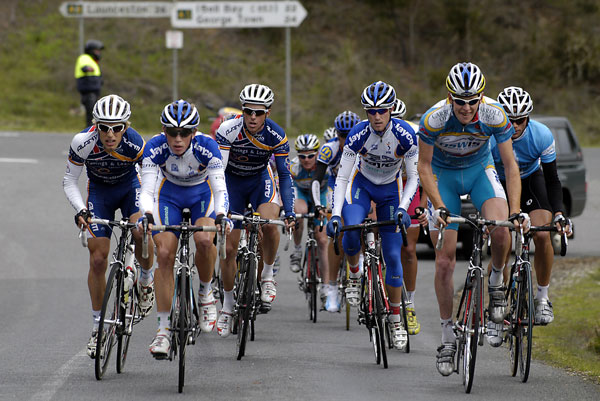
England says YSAS provides information not just for young people experiencing problems with substance abuse, but also their friends.
“We have a 24-hour phone line that they can call to express concern for themselves or a friend.
“We also have a website to access with a heap of information. If they don’t want to speak to someone, they can access the website for helpful information and tips.
“There is a lot of information on Google but a lot of it isn’t that accurate.
“All our information comes from evidence based research and is delivered and developed with young people in mind,” England says.
Through his work with YSAS, England is keen to take part in the organisation’s first foray into cycling events—Ride the Night, which is happening early next year.
The event, a partnership between YSAS, Bicycle Network and FebFast, aims to break the cycle of youth addiction.The inaugural ride will be held in Melbourne, with participants asked to ride from midnight to dawn on February 1 (there will be pre-ride festivities before the ride starts from 10pm on January 31).
Riders will take on a 75km course stopping at some of Melbourne’s iconic locations including the MCG, Shrine of Remembrance, Melbourne Zoo and the Westgate Bridge.
“I’m keen to change my sleeping patterns for it,” England says with a laugh.
He’s even considering taking along some of his program participants (older than 16) to tackle riding from the darkness to the light—a symbol of their struggles.
The event will also kick off the start of FebFast—a 28 day challenge for adults to give up alcohol and raise money to tackle youth addiction.
Though in his own youth England spent many hours on the bike, he admits he hasn’t had much of a chance to ride recently being busy with work and family life.
He is still involved in racing through his role as a consultant with Cycle Sport Victoria and admits he does have social rides, but nothing as full on as his younger years.
As ever, his main focus remains on changing lives, and using his bike to do it.
Did you know?
•YSAS is a not-for-profit agency enabling vulnerable young people with substance dependence and misuse issues, mental illness and social disconnection to take control of their health and wellbeing.
•YSAS was established in 1998 in direct response to increasing incidences of heroin overdose in hotspots throughout Victoria.
Ride On content is editorially independent, but is supported financially by members of Bicycle Network. If you enjoy our articles and want to support the future publication of high-quality content, please consider helping out by becoming a member.


